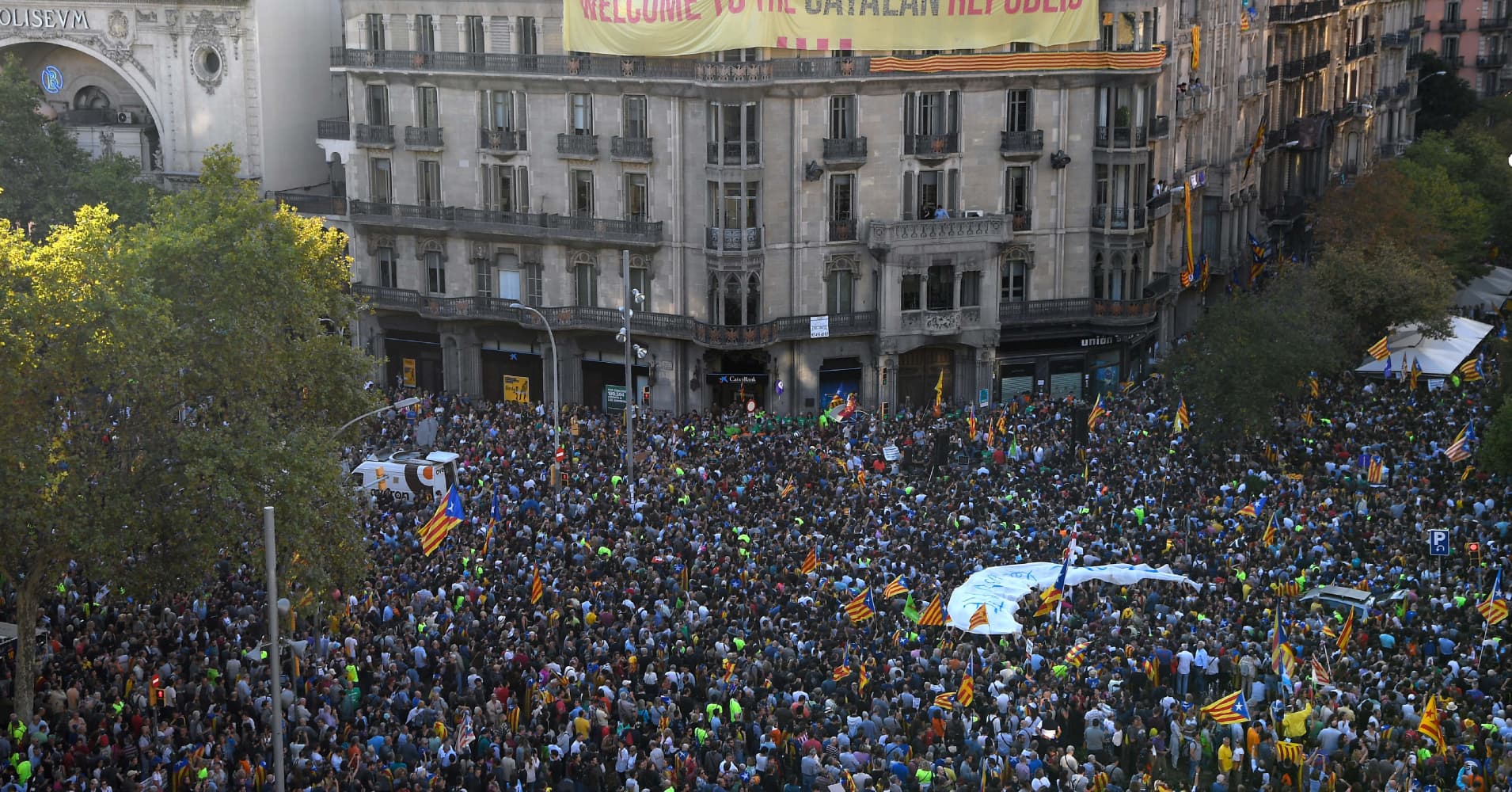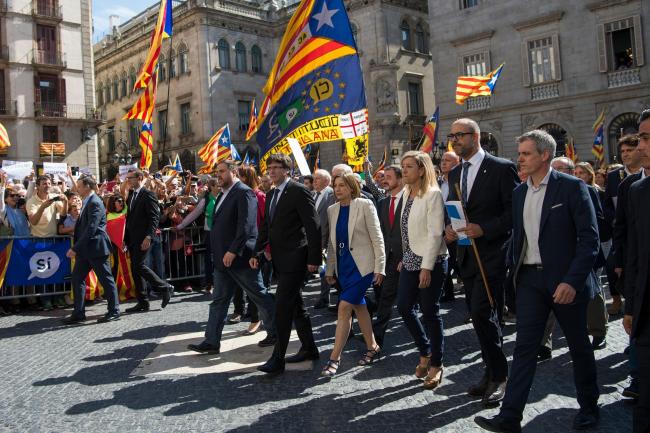- Joined
- Dec 6, 2010
- Messages
- 33,420
- Reaction score
- 5,681
Thread Index:
- Thousands protest in Madrid over proposed amnesty for Catalan separatists (Nov 18, 2023)
- Why Spain’s acting leader is offering a politically explosive amnesty for Catalan separatists (Nov 12, 2023)
- Catalonia row deepens over family’s push for Spanish in school (Dec 12, 2021)
- Thousands of Catalans rally for independence in Barcelona (Sept 21, 2021)
- Pardons for jailed Catalan independence leaders will be fast, limited and reversible (May 31, 2021)
- 'An outrage': Catalonia and the world reacts as separatist leaders handed jail terms (October 14, 2019)
- Catalonia to ask Spanish PM to agree to another independence referendum (6/28/18)
- New Spanish PM Pedro Sánchez signals softer approach to Catalonia (6/24/18)
- Spain's new government lifts budget controls on Catalonia (June 8, 2018)
- German prosecutors: Catalonia's former leader can be extradited back to Spain (Apr 3, 2018)
- Puigdemont arrest leaves Catalan independence movement on the ropes (March 26, 2018)
- Fugitive Ex-Catalan Leader Carles Puigdemont Arrested by German Police (March 25, 2018)
- Puigdemont confides to ally Catalonia secession drive ‘is over’ (Jan 31, 2018)
- Pro-independence parties win majority in regional parliament (Dec 21, 2017)
- Unionist or Separatist? Meet the candidates for Catalonia’s next president (Dec 04, 2017)
- Non-secessionist solution to Catalonia crisis possible, ousted leader says from Belgium (Nov 13, 2017)
- Catalonia’s Independence Bid Shows Signs of Strain as Coalition Splits (Nov. 8, 2017)
- Catalonia's ex-leader granted freedom to campaign for independence from Belgium (Nov 6, 2017)
- European Arrest Warrant issued for Puigdemont (Nov 3, 2017)
- Catalonia crisis: eight former Catalan ministers held in Spanish custody (Nov 2, 2017)
- Former Catalonia Leader Turns Up in Belgium After Spain Seeks Prosecution (Oct 30, 2017)
- Catalonia election: Puigdemont could run, "if he's not in jail" (Oct 29, 2017)
- Barcelona set for huge rally against Catalan independence (October 29, 2017)
- Spain officially takes charge of the Catalan government (Oct 28, 2017)
- Spain Dismisses Catalonia Government After Region Declares Independence (Oct 27, 2017)
- Catalan Lawmakers Voted for Independence in Defiance of Spain (Oct 27, 2017)
- Spain to suspend Catalonia's autonomy after regional leader fails to drop independence bid (Oct 19, 2017)
- Catalonia: Spain ultimatum looms over independence push (Oct 17, 2017)
- Madrid set to impose direct rule on Catalonia as independence deadline passes(Oct 16, 2017)
- Leader of Spain's Catalonia region faces mounting pressure from all sides (Oct 13, 2017)
- Spain asks Catalonia: did you declare independence or not? (Oct 11, 2017)
- Spain Catalan crisis: Reaction to Puigdemont from Madrid and Barcelona
- A Declaration of Independence, Sort of, for Catalonia (Oct 10, 2017)
- Hundreds of Thousands of Catalans Rally in Barcelona Against Independence (Oct 8, 2017)
- Carles Puigdemont accuses King Felipe VI of being government mouthpiece (Oct 5, 2017)
- Spain’s king calls independence vote by Catalonia ‘totally outside law and democracy’ (Oct 3, 2017)
- A look at what might happen if Catalonia goes it alone (Oct 2, 2017)
- Analysis: Spanish police attacks— mistake or part of a plan? (Oct 2, 2017)
- Catalonia Leaders Seek to Make Independence Referendum Binding (Oct 2, 2017)
- Catalan referendum: muted response from EU leaders over police crackdown (Oct 1, 2017)
- Rajoy says rule of law prevailed by blocking Catalan vote (Oct 1, 2017)
- Catalan leader: "Catalonia has won right to statehood' (Oct 1, 2017)
- Images of Spanish police beating Catalan voters becomes a PR nightmare for Rajoy (Oct 1, 2017)
- Catalan referendum: 'Hundreds hurt' as police try to stop voters (Oct 1, 2017)
- Catalonia, Elated but Fearful, Braces for Independence Vote (SEPT 29, 2017)
- Spain sends more police to block Catalonia referendum (Sept 22, 2017)
- Catalan leader presses on with banned vote on split from Spain
- Why the referendum on Catalan independence is illegal
- Spooked by Catalonia, EU rallies behind Madrid, but warily
- Here’s how bad economically a Spain-Catalonia split could really be
Huge crowds gather in Barcelona as Spanish police raid Catalonia government offices
By David Sim | September 20, 2017

Spain has cancelled all time off for police officers in Catalonia as tensions rise ahead of a planned referendum on the region's independence. Huge angry crowds have gathered in Barcelona after Spanish police raided local government offices and arrested several officials.

Police efforts to stop the 1 October vote on splitting from Spain have intensified in recent days as the region shows no signs of halting the referendum which the central government says is illegal. The National Catalan Assembly — the driving force behind the push for independence — called for supporters to rally peacefully outside local government offices on the corner of Rambla de Catalunya and Gran Via.

State police entered offices of the Catalan region's economy, interior, foreign affairs, welfare, telecommunications and tax departments. La Vanguardia newspaper said a dozen high-ranking local officials were arrested, including junior economy minister Josep Maria Jove, who was stopped by police while driving his daughter to school.

Pro-independence supporters scuffled with Spanish Civil Guard officers escorting a government official out of the headquarters of the region's department of foreign affairs in Barcelon. Xavier Puig, the IT manager in the department, was one of at least 12 officials arrested in police raids. The protesters tried to block a police vehicle and some scuffles ensued. There were no reports of arrests or injuries.

Spain's central government says the referendum goes against the country's 1978 constitution which states Spain is indivisible. Police, acting under court orders, have stepped up raids on printers, newspaper offices and private delivery companies in recent days in a search for campaign literature, instruction manuals for manning voting stations and ballot boxes.

Police seized nearly 10 million ballot papers that Catalan regional authorities planned to use in the independence referendum. A ministry statement said police also confiscated polling station signs and documents for voting officials in a raid on a warehouse in a small town outside Barcelona.

The fiercely pro-independence leader of Catalonia, Carles Puigdemont, called an emergency meeting of his Cabinet. He said Spain is showing a "totalitarian attitude" with the arrests of Catalan officials and civil servants. He vowed Catalonia will go ahead with the independence referendum despite legal warnings not to do so.
Barcelona Football Club put out a statement saying it condemns anyone trying to halt Catalonia's plan to hold the referendum. The club said it "will continue to support the will of the majority of Catalan people, and will do so in a civil, peaceful, and exemplary way."
Spain's Interior Ministry says all time off and holiday will be suspended for Civil Guard and National Police officers assigned to ensure that the Constitutional Court's halting of Catalonia's planned independence referendum is heeded. A ministry statement said the measure will run initially from Wednesday until 5 October – four days after the planned referendum.
https://uk.news.yahoo.com/huge-crowds-gather-barcelona-spanish-121032659.html
Last edited:






